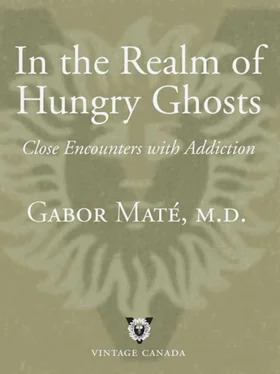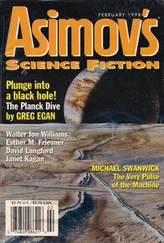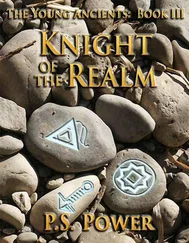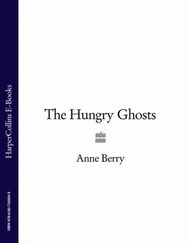One arena in which freedom of choice operates is the social world—the world of interactions, opportunities, and relationships; another is the inner realm of the psyche. In the first arena, which is shaped by our materialistic culture, it is futile to pretend that we all have equal freedom: just ask the hardcore drug user, acutely aware of his position at the very bottom of the social hierarchy.
Steve, a forty-year-old addict, has spent eighteen years of his adult life in prison. As he sat in my office one morning recently, he was staring out the window or at the wall or the ceiling—anything but looking at me directly. He’s angry, and he’s afraid of his anger. Bitterness pours from his heart, first about being obliged to drink methadone every day under a pharmacist’s supervision and then about many other features of his existence that he sees as being under the control of one authority or another—doctor, druggist, hotel staff, social worker. His frustration is not new: a sense of injustice colours the narrative of his entire life. “Freedom comes with a dollar sign attached,” he says. “The poor sap who collects a welfare cheque to keep him from sleeping in the street gets walked all over. He has no freedom. I’m always being told what to do. It’s like being back in jail; the only difference is that now and then I can get some pussy.”
For all his self-pity, there is also truth in Steve’s perception. Freedom in society is gauged by our success in getting what we want and conditioned by status and power, by race, class and gender. In the internal world of the psyche, however, freedom means something very different. It is the ability to opt for our long-term physical and spiritual well-being as opposed to our immediate urges. Absent that ability, any talk of “free will” or “choice” becomes nearly meaningless.
We recall Thomas De Quincey’s reference to his opium habit as “the chain of abject slavery.” The chains of addiction are internal and invisible. They fetter the mind first, the body second. We have seen that the addiction process commandeers powerful brain circuits and bends their activity towards maladaptive behaviours. We have also seen that in the addicted brain, the rational, impulse-regulating parts of the cortex are poorly developed even before the addiction takes hold, and they are further damaged by drug use. Thus the dilemma of freedom in addiction may be phrased this way: a person driven largely by unconscious forces and automatic brain mechanisms is only poorly able to exercise any meaningful freedom of choice.
A great deal of study has been devoted to the freedom-of-choice issue in the case of obsessive-compulsive disorder (OCD), a condition that has important features in common with addiction. We can learn a lot about psychic freedom from this research. Dr. Jeffrey Schwartz, Professor of Psychiatry at the UCLA School of Medicine, has devoted decades to studying OCD and has described his findings in two fascinating books. 1In OCD, certain circuits of the brain do not work normally. Several parts seem “locked” together—just as if a car’s transmission was stuck so that turning on the engine automatically set the wheels into motion. In OCD, the neurological gears that would uncouple the engine of thought from the wheels of action are stuck. Completely irrational thoughts or beliefs trigger repeated behaviours that are useless and even harmful. The obsessive-compulsive person is intellectually aware that his impulse to, say, wash his hands for the hundredth time lacks reason, but he cannot stop himself. Owing to his stuck neurological clutch, the idea of having to cleanse himself yet again leads automatically to hand washing. Dr. Schwartz and his colleagues at UCLA have demonstrated the mechanisms of this “brain lock,” as he has called it, on brain scans.
OCD may be an extreme example of how the brain can dictate behaviour even against our will, but OCD sufferers are different from other people only in degree. Much of what we do arises from automatic programming that bypasses conscious awareness and may even run contrary to our intentions, as Dr. Schwartz points out:
The passive side of mental life, which is generated solely and completely by brain mechanisms, dominates the tone and tenor of our day-to-day, even our second-to-second experience. During the quotidian business of daily life, the brain does indeed operate very much as a machine does. 2
Decisions that we may believe to be freely made can arise from unconscious emotional drives or subliminal beliefs. They can be dictated by brain mechanisms programmed early in childhood and determined by events of which we have no recollection. The stronger a person’s automatic brain mechanisms and the weaker the parts of the brain that can impose conscious control, the less true freedom that person will be able to exercise in her life. In OCD, and in many other conditions, no matter how intelligent and well-meaning the individual, the malfunctioning brain circuitry may override rational judgment and intention. Almost any human being, when overwhelmed by stress or powerful emotions, will act or react not from intention but from mechanisms that are set off deep in the brain, rather than being generated in the conscious and volitional segments of the cortex. When acting from a driven or triggered state, we are not free.
I interviewed Dr. Schwartz by telephone late one Friday evening—a discussion on addiction that might have made an outside observer roll his eyes: two nighthawk, workaholic physicians talking shop, a classic case of “it takes one to know one.” “When you get right down to the nuts and bolts of understanding what the brain is doing and the relationship between conscious experience and the brain,” Dr. Schwartz said, “the data does not support the commonly held principle that you can just will yourself into one mental state or another.
“It’s a subtle thing, freedom. It takes effort; it takes attention and focus to not act something like an automaton. Although we do have freedom, we exercise it only when we strive for awareness, when we are conscious not just of the content of the mind but also of the mind itself as a process. ”
When not governed by conscious awareness, our mind tends to run on automatic pilot. It is scarcely more ‘’free” than a computer that performs preprogrammed tasks in response to a button being pushed. The distinction between automatic mechanism and conscious free will may be illustrated by the difference between punching a wall with your fist in a fit of reactive rage and mindfully saying to yourself, “I have so much anger in me, I really want to punch this wall right now”—or even more consciously, “My mind tells me I should punch the wall.” The latter mind-states give you the option of not striking the wall, without which there is no choice and no freedom—just a fractured hand and a head full of regret. “Choice implies consciousness,” Eckhart Tolle points out, “—a high degree of consciousness. Without it, you have no choice.” 3
We may say, then, that in the world of the psyche, freedom is a relative concept: the power to choose exists only when our automatic mental mechanisms are subject to those brain systems that are able to maintain conscious awareness. A person experiences greater or less freedom from one situation to the next, from one interaction to the next, from one moment to the next. Anyone whose automatic brain mechanisms habitually run in overdrive has diminished capacity for free decision making, especially if the parts of the brain that facilitate conscious choice are impaired or underdeveloped.
We have said that addiction itself is a continuum, at one end of which lives the intravenous user hopelessly hooked to his habit. Most humans exist somewhere on that line between enslavement to destructive habits at one end and total consciousness and nonattachment at the other. In exactly the same way, freedom of choice can be represented as a continuum. Realistically, very few people could ever be found operating at the positive extreme, truly conscious and consistently free.
Читать дальше












